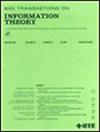Improved Constructions of Skew-Tolerant Gray Codes
IF 2.9
3区 计算机科学
Q3 COMPUTER SCIENCE, INFORMATION SYSTEMS
引用次数: 0
Abstract
Skew-tolerant Gray codes are Gray codes in which changes in consecutive codewords occur in adjacent positions. We present the first construction of asymptotically non-vanishing skew-tolerant Gray codes, offering an exponential improvement over previous work. We also provide linear-time encoding and decoding algorithms for our codes. Finally, we extend the definition to non-binary alphabets, and provide constructions of complete抗斜灰色码的改进结构
容斜灰色码是指相邻位置的连续码字发生变化的灰色码。我们提出了渐近不消失的容偏灰色码的第一个构造,提供了一个指数改进比以前的工作。我们还为我们的代码提供了线性时间编码和解码算法。最后,我们将定义扩展到非二进制字母,并提供了每个碱基$m\geqslant 3$的完全m-ary容斜Gray码的构造。
本文章由计算机程序翻译,如有差异,请以英文原文为准。
求助全文
约1分钟内获得全文
求助全文
来源期刊

IEEE Transactions on Information Theory
工程技术-工程:电子与电气
CiteScore
5.70
自引率
20.00%
发文量
514
审稿时长
12 months
期刊介绍:
The IEEE Transactions on Information Theory is a journal that publishes theoretical and experimental papers concerned with the transmission, processing, and utilization of information. The boundaries of acceptable subject matter are intentionally not sharply delimited. Rather, it is hoped that as the focus of research activity changes, a flexible policy will permit this Transactions to follow suit. Current appropriate topics are best reflected by recent Tables of Contents; they are summarized in the titles of editorial areas that appear on the inside front cover.
 求助内容:
求助内容: 应助结果提醒方式:
应助结果提醒方式:


